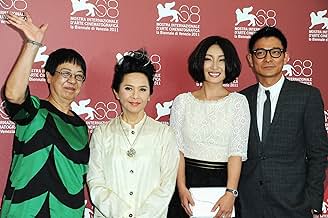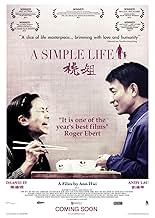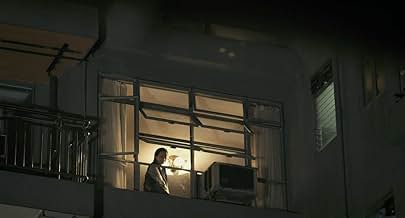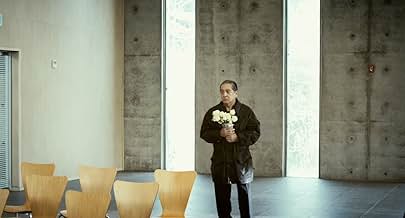IMDb RATING
7.5/10
6.5K
YOUR RATING
After suffering a stroke, an altruistic maid announces that she wants to quit her job and move into an old people's home.After suffering a stroke, an altruistic maid announces that she wants to quit her job and move into an old people's home.After suffering a stroke, an altruistic maid announces that she wants to quit her job and move into an old people's home.
- Awards
- 38 wins & 27 nominations total
Man-sze Yu
- Sharon
- (as Wendy Yu)
Elena Mei-Ye Kong
- Aunt Kam's daughter
- (as Elena Kong)
Chi-san Chan
- Jason
- (as Jason Chan)
So-Ying Hui
- Mui
- (as Ho So-Ying)
Raymond Man-Wai Chow
- Self (Guest appearance)
- (as Raymond Chow)
Felicia Chow
- Self (Guest appearance)
- (as Mrs. Raymond Chow)
Featured reviews
8Itoc
I saw this film during the film festival in Norway; it's been a long, long time since I watched a movie which captivated me even after the credit started to roll.
It's a movie which primarily focus on every little moment of an elderly woman, but it is never a dull moment as the first impression might seem. It's a movie which really drives you to care for the characters in a natural way as opposed to many films where they "force" you with "natural" gimmicks. No, this movie broke most typical western styles, but at the same time made it entertaining and thrilling.
It's a movie where there're no explosions, no foresight drama or no extreme twists... it's truly, a simple life, which showed me how simple it can be to be humble, and care for those we love.
It's a movie which primarily focus on every little moment of an elderly woman, but it is never a dull moment as the first impression might seem. It's a movie which really drives you to care for the characters in a natural way as opposed to many films where they "force" you with "natural" gimmicks. No, this movie broke most typical western styles, but at the same time made it entertaining and thrilling.
It's a movie where there're no explosions, no foresight drama or no extreme twists... it's truly, a simple life, which showed me how simple it can be to be humble, and care for those we love.
'A simple life' is a film about human kindness. About caring for others. About harmonious human relationships. Does this sound cheesy? It's not meant that way. The film shows how caring for one another can make a difference, but it's never sentimental and there's no tear jerking at all.
The story centres around A Tao, a housekeeper who cooks and cleans for film producer Roger, who is not married and travels a lot. When returning home from one of his travels from Hong Kong to mainland China, A Tao doesn't open the door. She has had a stroke and after her stay in the hospital, she moves to an old people's home. Roger visits her regularly and gradually they become closer. At the start of the movie they are employer and employee, at the end they are friends.
Director Ann Hui shows this process with small, symbolic scenes. When A Tao serves Roger his food in one of the first scenes, only one word is spoken, when she asks him to move something on the table to make room for the dish she has prepared. The contrast with another key scene, later on in the movie, is huge. After A Tao has recovered from the stroke, Roger takes her to the first screening of his new film and introduces her to movie stars as his godmother. Afterwards, they walk away hand in hand, chattering affectionately about the film business.
A Tao visibly enjoys this party, and the attention she receives from her 'godson'. This is just one of the examples of the wonderful acting by Deannie Yip, a famous actress in the Hong Kong film industry but unknown to the rest of the world. In this film, she seemingly effortlessly plays A Tao first as a humble servant, then as a physically handicapped patient and also as a coquettish lady. How wonderful it must have been for her to receive a 'best actress'-award at the Venice Film Festival for her part as A Tao.
The film focuses on the relationship between Roger and A Tao, and the development of their mutual appreciation. Apart from that, not much really happens. There are some humorous little scenes that will make you smile, as well as some more emotional ones. This is a slow and low-profile film, to be appreciated by a typical art-house audience.
The story centres around A Tao, a housekeeper who cooks and cleans for film producer Roger, who is not married and travels a lot. When returning home from one of his travels from Hong Kong to mainland China, A Tao doesn't open the door. She has had a stroke and after her stay in the hospital, she moves to an old people's home. Roger visits her regularly and gradually they become closer. At the start of the movie they are employer and employee, at the end they are friends.
Director Ann Hui shows this process with small, symbolic scenes. When A Tao serves Roger his food in one of the first scenes, only one word is spoken, when she asks him to move something on the table to make room for the dish she has prepared. The contrast with another key scene, later on in the movie, is huge. After A Tao has recovered from the stroke, Roger takes her to the first screening of his new film and introduces her to movie stars as his godmother. Afterwards, they walk away hand in hand, chattering affectionately about the film business.
A Tao visibly enjoys this party, and the attention she receives from her 'godson'. This is just one of the examples of the wonderful acting by Deannie Yip, a famous actress in the Hong Kong film industry but unknown to the rest of the world. In this film, she seemingly effortlessly plays A Tao first as a humble servant, then as a physically handicapped patient and also as a coquettish lady. How wonderful it must have been for her to receive a 'best actress'-award at the Venice Film Festival for her part as A Tao.
The film focuses on the relationship between Roger and A Tao, and the development of their mutual appreciation. Apart from that, not much really happens. There are some humorous little scenes that will make you smile, as well as some more emotional ones. This is a slow and low-profile film, to be appreciated by a typical art-house audience.
Ann Hui's "A Simple Life" is a poignant and melancholic film about the relationship between an old servant and her companion, a successful film producer to whose family the servant had been in service with. It is a beautiful, touching, and, more importantly, human film. It lives and breathes its own life with the help of the cast and crew involved.
The performances by Andy Lau as Roger the man and especially Deannie Yip as Ah Tao complement the movie's atmosphere as a whole. It is a warm, homely and crystal-clear one – subtly quiet, slightly louder when there's more people around. This film's screenplay relies more on the look on the actors' faces rather than relying on dialogue. This is a good thing. It allows the audience to focus on the performances in rapt attention. Relying on dialogue/subtitles more than often will distract from the movie. This is one movie which follows my rule for any great movie: subtlety is key. In many dramatic Chinese movies, the piano is a must for every music score, and it is overdone cheesily at many times. For this movie, however, composer Law Wing-Fai knows crucial music timing - the music is not overdone, yet not too minimal, and it knows when to appear at the right time. Correct.
Hui's focused yet calm, serene direction basically drives Susan Chan's screenplay right at home. Hui seems to have learned a thing or two about human drama from greats like Yasujiro Ozu and Akira Kurosawa – it is put into terrific use here. But Yip's performance as the altruistic Ah Tao is simply wonderful; her face and body language speak more than herself, her vocal qualities ranging from sharp balking to solemn calm. She is the heart of the movie, alive, beating and like her, moving quietly along as her life goes by. Lau is also very good here, being more stoic than usual but hiding uneasiness within his eyes.
There is no great story without good characters, and "A Simple Life" has two great characters that drives the movie. Roger is a successful film producer, his whole family has migrated to America, and he's seemingly living the high life with his wealthy friends (featuring many non- intrusive cameos by Chinese celebrities including humorous ones by Sammo Hung, Tsui Hark and Anthony Wong) and yet he is more concerned with Ah Tao than everyone else. Ah Tao is an orphan since World War II and has since been serving Roger's family for four generations without expecting any sort of compensation in return. Roger doesn't mind taking care of Ah Tao as everyone else progresses around him – the same way Ah Tao doesn't mind living her life on her own at an old folks' home without Roger to help her around after a stroke attack – she feels guilty if he did that. The two characters are bonded, play with, even depend on each other as if they're the only two people who understand each other. A sort of mother-son love, but more powerful. Compare with later scenes with Roger and his real mother and you'll see the difference. I'm not implying Roger's real mother is a morally bad character, far from it. The relationship between them is more real and human than I had expected.
Some will call this tedious and pretentious; others will call it pointless. I'm not sure, but I'd love to see movies like this where the characters unwrap the story around them as life progresses with its ups and downs. Sure, there are a few bits and pieces that did not really relate to the main character's story – but they make up the story and the characters as a whole – shaping this narrative up. It is a thing of beauty. So is life. So is this film - one of the year's best.
Overall rating: 88%
The performances by Andy Lau as Roger the man and especially Deannie Yip as Ah Tao complement the movie's atmosphere as a whole. It is a warm, homely and crystal-clear one – subtly quiet, slightly louder when there's more people around. This film's screenplay relies more on the look on the actors' faces rather than relying on dialogue. This is a good thing. It allows the audience to focus on the performances in rapt attention. Relying on dialogue/subtitles more than often will distract from the movie. This is one movie which follows my rule for any great movie: subtlety is key. In many dramatic Chinese movies, the piano is a must for every music score, and it is overdone cheesily at many times. For this movie, however, composer Law Wing-Fai knows crucial music timing - the music is not overdone, yet not too minimal, and it knows when to appear at the right time. Correct.
Hui's focused yet calm, serene direction basically drives Susan Chan's screenplay right at home. Hui seems to have learned a thing or two about human drama from greats like Yasujiro Ozu and Akira Kurosawa – it is put into terrific use here. But Yip's performance as the altruistic Ah Tao is simply wonderful; her face and body language speak more than herself, her vocal qualities ranging from sharp balking to solemn calm. She is the heart of the movie, alive, beating and like her, moving quietly along as her life goes by. Lau is also very good here, being more stoic than usual but hiding uneasiness within his eyes.
There is no great story without good characters, and "A Simple Life" has two great characters that drives the movie. Roger is a successful film producer, his whole family has migrated to America, and he's seemingly living the high life with his wealthy friends (featuring many non- intrusive cameos by Chinese celebrities including humorous ones by Sammo Hung, Tsui Hark and Anthony Wong) and yet he is more concerned with Ah Tao than everyone else. Ah Tao is an orphan since World War II and has since been serving Roger's family for four generations without expecting any sort of compensation in return. Roger doesn't mind taking care of Ah Tao as everyone else progresses around him – the same way Ah Tao doesn't mind living her life on her own at an old folks' home without Roger to help her around after a stroke attack – she feels guilty if he did that. The two characters are bonded, play with, even depend on each other as if they're the only two people who understand each other. A sort of mother-son love, but more powerful. Compare with later scenes with Roger and his real mother and you'll see the difference. I'm not implying Roger's real mother is a morally bad character, far from it. The relationship between them is more real and human than I had expected.
Some will call this tedious and pretentious; others will call it pointless. I'm not sure, but I'd love to see movies like this where the characters unwrap the story around them as life progresses with its ups and downs. Sure, there are a few bits and pieces that did not really relate to the main character's story – but they make up the story and the characters as a whole – shaping this narrative up. It is a thing of beauty. So is life. So is this film - one of the year's best.
Overall rating: 88%
10JvH48
I saw this film as part of the Rotterdam Film Festival 2012. Relatively long with nearly 2 hours running time, but not long winded at all. How does this film maker achieve that?? Carefully filmed, very nearby the two main characters. At the same time it showed an inside view in a retirement home, and a small view over the fence into the film industry.
The retirement home at hand may look different from similar institutions in our own country, but that is only the surface. Like here in The Netherlands, it is a small population with very different people who did not choose each other, many of them leading vegetative lives. Our first main character (the "amah", a lifelong help) is still relatively active, in spite of her stroke. Being moved to the retirement home was her explicit wish, unwilling to become a burden for the family she served for 60 years. This particular situation is something we cannot imagine in our own world, but apparently it exists there.
The other main characters is the last living son of the family. Though not being blood relatives, we see the two main characters behave like mother and son. To the outside world they explain their relationship as mother and godson, or alternatively as aunt and nephew, whatever fits the situation best. Her position as an "amah" is not known to others than the immediate family members, who all seem to care for her.
The inside view in the film industry is less extensive and mostly concentrated in the beginning, with a hefty meeting about an ever growing budget that some film maker needed, and a subsequent meeting with a bank manager about the fine print in a contract that was ignored by the bank. It merely serves to portray the "son" part in the story, and to explain why he is abroad for longer periods and cannot always find time to visit the retirement home. This has the definite purpose to prevent putting him on display as someone not caring. We see the fact that he really cares confirmed in the way he brings her along to a industry screening of this newly produced film, presenting her as his aunt.
The retirement home at hand may look different from similar institutions in our own country, but that is only the surface. Like here in The Netherlands, it is a small population with very different people who did not choose each other, many of them leading vegetative lives. Our first main character (the "amah", a lifelong help) is still relatively active, in spite of her stroke. Being moved to the retirement home was her explicit wish, unwilling to become a burden for the family she served for 60 years. This particular situation is something we cannot imagine in our own world, but apparently it exists there.
The other main characters is the last living son of the family. Though not being blood relatives, we see the two main characters behave like mother and son. To the outside world they explain their relationship as mother and godson, or alternatively as aunt and nephew, whatever fits the situation best. Her position as an "amah" is not known to others than the immediate family members, who all seem to care for her.
The inside view in the film industry is less extensive and mostly concentrated in the beginning, with a hefty meeting about an ever growing budget that some film maker needed, and a subsequent meeting with a bank manager about the fine print in a contract that was ignored by the bank. It merely serves to portray the "son" part in the story, and to explain why he is abroad for longer periods and cannot always find time to visit the retirement home. This has the definite purpose to prevent putting him on display as someone not caring. We see the fact that he really cares confirmed in the way he brings her along to a industry screening of this newly produced film, presenting her as his aunt.
This is a simple film - two main characters with no blood relation and yet deeply connected to each other - and presumably made with a modest budget. It is slow, and arguably a tad long (but I am OK with it), but as the story evolves I begin to care about them.
As a film it is a great antidote to the sex, violence, intriguing plots, and CGI (I must admit I like some of those too) that we are so used to on the big screen these days. Director Ann Hui indicated the story was inspired by true events and I believe her. What makes this story unique is we are looking at love, respect and a feeling of duty and obligation between two human beings as if they were mother and son - but they are not. Instead, what started out as a servant-master relationship transcended itself to become something more sublime when the care-giver became incapacitated and the table was turned. When this happened the roles were reversed and yet it happened in such an unforced, natural and leisurely fashion.
There are tear-jerking moments, of course, but they came in such an unpretentious manner. The ending is as you would expect when age and illness took their toll on Tao Jie, played by Deannie Yip. And yet, I finished watching the film feeling uplifted, and with a strong sense of hope on humanity.
As a film it is a great antidote to the sex, violence, intriguing plots, and CGI (I must admit I like some of those too) that we are so used to on the big screen these days. Director Ann Hui indicated the story was inspired by true events and I believe her. What makes this story unique is we are looking at love, respect and a feeling of duty and obligation between two human beings as if they were mother and son - but they are not. Instead, what started out as a servant-master relationship transcended itself to become something more sublime when the care-giver became incapacitated and the table was turned. When this happened the roles were reversed and yet it happened in such an unforced, natural and leisurely fashion.
There are tear-jerking moments, of course, but they came in such an unpretentious manner. The ending is as you would expect when age and illness took their toll on Tao Jie, played by Deannie Yip. And yet, I finished watching the film feeling uplifted, and with a strong sense of hope on humanity.
Did you know
- ConnectionsFeatured in Women Make Film: A New Road Movie Through Cinema (2018)
- How long is A Simple Life?Powered by Alexa
Details
- Release date
- Countries of origin
- Official site
- Languages
- Also known as
- A Simple Life
- Filming locations
- Production companies
- See more company credits at IMDbPro
Box office
- Budget
- CN¥30,000,000 (estimated)
- Gross US & Canada
- $191,826
- Opening weekend US & Canada
- $43,372
- Apr 15, 2012
- Gross worldwide
- $4,776,272
- Runtime1 hour 58 minutes
- Color
- Sound mix
- Aspect ratio
- 1.85 : 1
Contribute to this page
Suggest an edit or add missing content




































